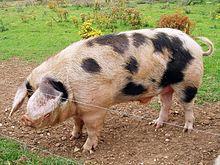Gloucestershire Old Spots

A Gloucestershire Old Spots boar
|
|
| Conservation status | Rare breed |
|---|---|
| Other names |
|
| Country of origin | England |
| Traits | |
|
|
The Gloucestershire Old Spots (also "Gloucester, Gloucester Old Spot, Gloucestershire Old Spot" or simply "Old Spots") is an English breed of pig which is predominantly white with black spots. It is named after the county of Gloucestershire. The Gloucestershire Old Spots pig is known for its docility, intelligence, and prolificity. Boars reach a mature weight of 600 lb (272 kg) and sows 500 lb (227 kg). The pigs are white with clearly defined black (not blue) spots. There must be at least one spot on the body to be accepted in the registry. The breed's maternal skills enable it to raise large litters of piglets on pasture. Its disposition and self‑sufficiency should make it attractive for farmers raising pasture pigs and those who want to add pigs to diversified operations.
The Gloucestershire Old Spots (GOS) Breed Society was formed in 1913. The originators of that society called the breed 'Old' Spots because the pig had been known for as long as anyone could remember. The first pedigree records of pigs began in 1885, much later than it did for cattle, sheep and horses because the pig was a peasant's animal, a scavenger and was never highly regarded. No other pedigree spotted breed was recorded before 1913, so today's GOS is recognised as the oldest such breed in the world. From the British Pig Association: "Although if old paintings are to be trusted, there have been spotted pigs around for two or three centuries, the Gloucestershire Old Spots has only had pedigree status since the early 20th century."
Besides its correct title and variations such as Gloster Spot or just Old Spot, the breed is also known as the "Orchard Pig" and "The Cottager's Pig". Despite these humble origins, both The Prince of Wales and The Princess Royal keep GOS pigs on their respective Gloucestershire estates.
One other notable contributor is the Lincolnshire Curly Coat, a pig that has since gone extinct. The Old Spots is also genetically and characteristically similar to the extinct Cumberland pig and is being used in its attempted recreation in the UK. These breeds were regarded as thrifty and excellent foragers, supplementing their feed with roots and vegetation. Additionally, the GOS gene pool has contributed to the American Spot and the Chester White. Additional commonalilties among these breeds include excellent maternal instincts and even temperament, as Old Spots tend to be very calm, good-natured animals, another trait that makes them desirable to homesteaders and small farmers. The females tend to be very devoted mothers, while the males seldom pose a threat to piglets.
...
Wikipedia
